Filter by

European Arrest Warrant
This book examines the European arrest warrant as a successful and effective instrument for judicial co-operation in criminal matters in the European Union. Providing comprehensive content and combining theoretical and practical aspects, it covers all of the major issues surrounding the European arrest warrant. The book analyses its genesis, main features, surrender procedure, case law, impleme…
- Edition
- -
- ISBN/ISSN
- 978-3-319-07338-5
- Collation
- XV, 375
- Series Title
- -
- Call Number
- -
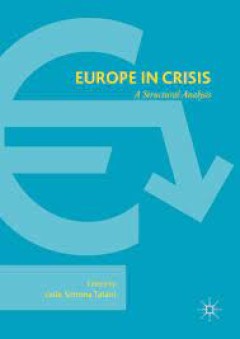
Europe in Crisis A Structural Analysis
With contributions from a range of expert scholars in European economics, politics and social policy, this edited collection analyses the crisis in Europe by exploring the structural asymmetries of the Economic and Monetary Union (EMU) and European monetary integration. Structured in two parts, the chapters in this book discuss the impact of the global financial crisis on the Euro area; the fai…
- Edition
- -
- ISBN/ISSN
- 978-1-137-57707-8
- Collation
- 2 b/w illustrations, 8 illustrations in colour
- Series Title
- -
- Call Number
- -

Investing into North African Solar Power: A Legal Framework for Risk Manageme…
This book investigates how a North African solar thermal power plant can be set up under the guidance of European investors (e.g. the Desertec Concept) as a Public Private Partnership (PPP). It outlines the importance of early awareness of contract-related risks, investment risks and dispute settlement, arguing that commercial and investment arbitration are the best tools for settling disputes …
- Edition
- -
- ISBN/ISSN
- 978-3-319-15756-6
- Collation
- -
- Series Title
- -
- Call Number
- -
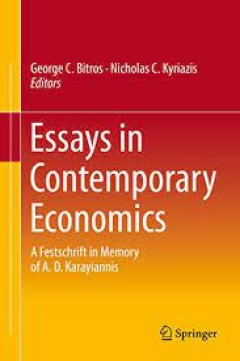
Essays in Contemporary Economics A Festschrift in Memory of A. D. Karayiannis
This book is a collection of original essays grouped into four parts under the headings “Greece and European integration,” “Issues in the Methodology of Economics,” “Institutions and the Free Market Economy,” and “Insights for Today from Ancient Greece.” The essays appeal to both researchers in the corresponding fields of knowledge and also to policy makers who are looking for i…
- Edition
- -
- ISBN/ISSN
- 978-3-319-10043-2
- Collation
- 3 b/w illustrations
- Series Title
- -
- Call Number
- -
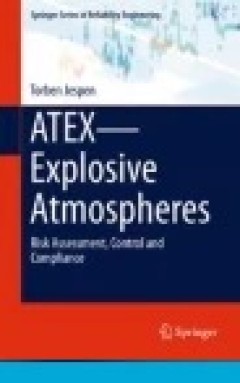
ATEX—Explosive Atmospheres: Risk Assessment, Control and Compliance
This book details how safety (i.e. the absence of unacceptable risks) is ensured in areas where potentially explosive atmospheres (ATEX) can arise. The book also offers readers essential information on how to comply with the newest (April 2016) EU legislation when the presence of ATEX cannot be avoided. By presenting general guidance on issues arising out of the EU ATEX legislation – espec…
- Edition
- Ed. 1
- ISBN/ISSN
- 978-3-319-31367-2
- Collation
- XII, 197
- Series Title
- Springer Series in Reliability Engineering
- Call Number
- 600 JES a

The Sub-national Dimension of the EU A Legal Study of Multilevel Governance
This book is the first monograph-form legal study on multilevel governance in the EU and represents a radical change in the approach to this topic. Particularly after the Treaty of Lisbon’s entry into force, research on multilevel governance can no longer remain confined to the analysis of political dynamics or of soft law arrangements. Multilevel governance emerges as a constitutional princi…
- Edition
- -
- ISBN/ISSN
- 978-3-319-14589-1
- Collation
- -
- Series Title
- -
- Call Number
- -

The Socioeconomic Evolution of the European Union Exploring the Electronic F…
This volume explores the role of territory in the creation, maintenance and extension of a new type of frontier, the electronic frontier, from a social and economic point of view. It departs from the earlier concepts of borders – state, social, economic, ethnic, religious, etc. – to investigate the fluidity of borders and their shift towards an axis-based paradigm within the free-movement …
- Edition
- -
- ISBN/ISSN
- 978-3-319-40304-5
- Collation
- -
- Series Title
- -
- Call Number
- -
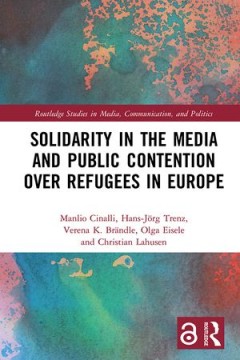
Solidarity in the Media and Public Contention over Refugees in Europe
This book examines the ‘European refugee crisis’, offering an in-depth comparative analysis of how public attitudes towards refugees and humanitarian dispositions are shaped by political news coverage. An international team of authors address the role of the media in contesting solidarity towards refugees from a variety of disciplinary perspectives. Focusing on the public sphere, t…
- Edition
- -
- ISBN/ISSN
- 9781000370485
- Collation
- -
- Series Title
- -
- Call Number
- 302.23 SOL s

Migrant Protest: Interactive Dynamics in Precarious Mobilizations
Migrant protest has proliferated worldwide in the last two decades, explicitly posing questions of identity, rights, and equality in a globalized world. Nonetheless, such mobilizations are considered anomalies in social movement studies, and political sociology more broadly, due to 'weak interests' and a particularly disadvantageous position of 'outsiders' to claim rights connected to citizensh…
- Edition
- -
- ISBN/ISSN
- 9789048550197
- Collation
- -
- Series Title
- -
- Call Number
- 351.81 STE m
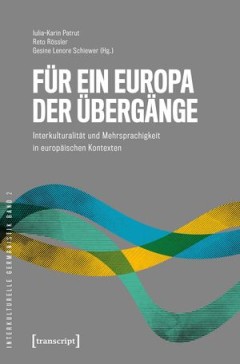
Für ein Europa der Übergänge Interkulturalität und Mehrsprachigkeit in e…
Europa kann neu gedacht werden: nicht von den Grenzen und Leitdifferenzen her, sondern von den Übergängen. Die aus vier Kontinenten stammenden Beiträgerinnen und Beiträger befassen sich mit der Frage, inwiefern die Fähigkeit, ästhetische, sprachliche und kulturelle Übergänge angesichts hoher Heterogenität hervorzubringen, Europa am ehesten ausmacht. Von Fatou Diome bis Yoko Tawada, von…
- Edition
- -
- ISBN/ISSN
- 9783839461570
- Collation
- -
- Series Title
- -
- Call Number
- -
 Computer Science, Information & General Works
Computer Science, Information & General Works  Philosophy & Psychology
Philosophy & Psychology  Religion
Religion  Social Sciences
Social Sciences  Language
Language  Pure Science
Pure Science  Applied Sciences
Applied Sciences  Art & Recreation
Art & Recreation  Literature
Literature  History & Geography
History & Geography